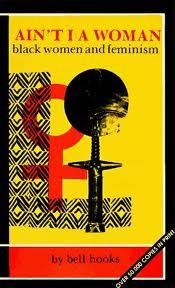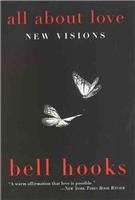bell hooks: Ain’t I a Woman?

By Shanika Thomas.
Of all the writers I love and enjoy, none has influenced me more than author, feminist advocate, and cultural critic, Gloria Jean Watkins, better known by her penname, (purposely lower-cased), bell hooks. Her books have contributed to my way of thinking and understanding of feminism and its interconnectivity with “white supremacist capitalist patriarchy”, a term she coined in the 1980s. Her work is inexhaustible; to be read again and again, giving one the tools to achieve self-love and self-awareness, as well as the ability to think critically about the culture of domination.
Born September 25, 1952 in Hopkinsville, Kentucky in a working class family with five sisters and one brother, bell hooks found a love for books and poetry. In a home where she grew up under a patriarchal father, whom she feared, and at times hated, and where she was often seen as odd, for, what her family saw as an obsession with books, words were a place for her to escape and be comforted. She speaks about her life as a child growing up in the racially segregated South in her memoir “Bone Black: Memoirs from Girlhood”. It is in this poetic account of her girlhood that hooks writes, “I belong in this place of words. This is my home.” She speaks often about her life as a writer in books such as “Remembered Rapture” and “Wounds of Passion”, and often encourages others to write about their experiences and to tell their stories.
Hooks has written about many subjects, from nature, spirituality and healing, to self-love, self-awareness and healthy relationships, to critiques on films and art. She often makes mention of other books and writers in her work, giving her readers expanded resources and knowledge of the works that have inspired and influenced her.
As a college professor, she emphasizes the need for “education as the practice of freedom and transgression”, and the need to teach the skill of critical thinking. She says, “Often when I am asked to talk about how I became bell hooks, renowned writer and intellectual, how I survived the racist, sexist, classist, elitism outside the home of my growing up and the dysfunction which sanctioned abuse, betrayal and abandonment within the patriarchal home, I talk about the significance of critical thinking.”
bell hooks has been criticized for her seemingly abrasive critical approach. She notes that for women, (especially black women within the context of racism who are often caricatured as “angry”), “many times our dissenting voice is seen as an angry voice”.
 Her first book, “Aint I a Woman” written when she was only 19, was bold and fierce in its critiques of misogyny, white supremacy and capitalism. She says that in her 20s and early 30s, she was most obsessed with finding words to explain systems of domination, to critique and to find a voice to express militant resistance. She acknowledges that her “voice was, at times, shrill and piercing, full of the pain feelings of powerlessness engenders, coupled with awareness of the choke hold dominator culture had on (her) consciousness.” The status quo, who interpreted her voice as an angry voice, thought it was therefore, a voice to be dismissed and not taken seriously. She shares that through time, she began to see the need to cultivate communication skills that would enable her to express her ideas in a manner that was an invitation for audiences to listen and to open their minds rather than close them. She credits her Buddhist teachers and her Buddhist-Christian practice of nonviolent communication with this new vision.
Her first book, “Aint I a Woman” written when she was only 19, was bold and fierce in its critiques of misogyny, white supremacy and capitalism. She says that in her 20s and early 30s, she was most obsessed with finding words to explain systems of domination, to critique and to find a voice to express militant resistance. She acknowledges that her “voice was, at times, shrill and piercing, full of the pain feelings of powerlessness engenders, coupled with awareness of the choke hold dominator culture had on (her) consciousness.” The status quo, who interpreted her voice as an angry voice, thought it was therefore, a voice to be dismissed and not taken seriously. She shares that through time, she began to see the need to cultivate communication skills that would enable her to express her ideas in a manner that was an invitation for audiences to listen and to open their minds rather than close them. She credits her Buddhist teachers and her Buddhist-Christian practice of nonviolent communication with this new vision.
When she began to write more about love, hooks says her critics took it as a sign that she was becoming “soft”. Hooks points out that these questions are not asked of men who write about love, yet powerful women, especially intellectual women, have always been stereotyped as emotionally lacking. Hooks encourages her readers to interpret her writing about love as “a testimony to (her) intellectual growth or to visionary insight” rather than allowing sexist thinking to devalue that experience and make it appear that the choice to think critically about love is weak, aberrant behavior. She has written several books on the subject, including
Communion: The Female Search for Love, All about Love: New Visions, and Salvation: Black People and Love. Her writings on the issue of love, focuses on its relationship to peace, justice and domination culture. She explains that it is through the work of love that we move from the politics of blame to the politics of accountability.

Hooks is the author of over 30 books, including the children’s books: Happy to Be Nappy, Homemade Love, and Be Boy Buzz, which encourage healthy self-image and self-esteem for black American children. Her work has had a great influence on feminist theory. In 1992, Publisher’s Weekly named her 1981 work, Ain’t I a Woman: Black Women and Feminism as one of the most influential women’s books in the last twenty years. She currently resides in Sarasota, Florida where she is a professor at the New College of Florida.
Most recently, she has been speaking a lot about therapy. She says that she “talks about therapy more than ever before because we are losing our minds”. She talks about the stress of racism and the need for healing. In 2010, Berea College launched the bell hooks Institute for Critical Thinking, Contemplation and Dreaming, which she hopes “will create an environment where people can talk intimately about issues that need to be brought to the forefront.”
She continues to be a voice resistance. Like the biblical prophet, she is “the voice of one crying in the wilderness” speaking with prophetic vision for the struggle to end racism, white supremacy, sexism, homophobia, patriarchy and all oppression and domination.
Her most recent book is entitled Belonging: A Culture of Place.
